
Category: East Asia
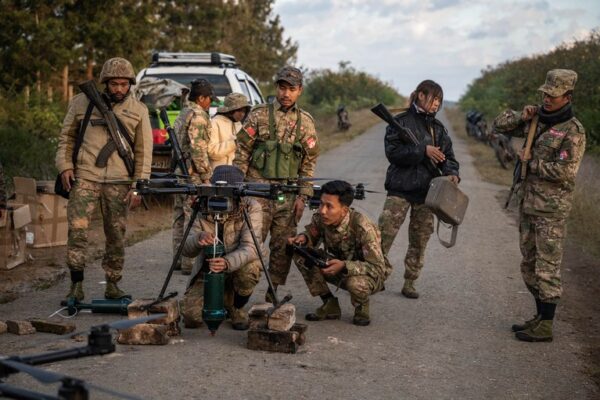
The Myanmar military’s air superiority is slipping away amid sanctions and opposition attacks
One of the most important setbacks for Myanmar’s military since an opposition alliance launched Operation 1027 last October has been the loss of three different aircraft: two jet trainers and an Mi-17 heavy-lift helicopter. An Mi-35 attack helicopter was also lost in 2023. The Myanmar military should have total air superiority. For the first two years of the conflict, the opposition National Unity Government’s (NUG) best air defense was doxing Air Force pilots – publishing their addresses, as part of an assassination campaign. Gradually, the NUG’s People’s Defense Force militias began to erode the junta’s air superiority by effectively deploying armed drones. Significantly, we’re now seeing Ethnic Resistance Organizations (EROs) begin to deploy air defenses, at a time when the junta has become even more dependent on air attacks. That increased tempo of operations requires more maintenance on overworked airframes. Fighters of anti-junta Mandalay People’s Defense Forces prepare a drone with an explosive-drop amid clashes with Myanmar junta forces in northern Shan State, Dec. 11, 2023. These military junta losses matter for three reasons. First, while not small by regional standards, the Myanmar Air Force (MAF) certainly does not have excess capacity. At the top end, it has some 31 SU-29s and four recently delivered SU-30s from Russia. The recently delivered seven JF-17s multi-role fighters, jointly produced by China and Pakistan, are reportedly already grounded due to cracks in their airframes and other maintenance issues. Airworthiness questions On paper, Myanmar has approximately 40 other jet fighters, but these are old, Chinese-produced knock-off Russian jets from the 1990s. They are well beyond their service life. The MAF is thought to have 20 Nanchang Q-5s, the Chinese version of the MiG-19, down from the 36 it imported from 1994-2001. It also has some 21 Chengdu J-7s, a Chinese produced MiG-21. That’s down from some 60 that it had purchased from 1990-1999. It’s unclear how many of these fighters are still airworthy. Myanmar’s military has relied on its 18 Russian-built Yak-130 trainers for much of its combat operations. Since the February 2021 coup, Myanmar has taken delivery of some six Guizhou JL-9 jet trainers, referred to as FTC-2000G, which have a spotty performance and safety record. A fighter of anti-junta Mandalay People’s Defense Forces pilots a drone near the frontline amid clashes with Myanmar junta forces in northern Shan State, Dec.11, 2023. (AFP Photo) The MAF also flies an unknown number of Chinese K-8 trainers that can be used for ground support. Second, we should also assume that given sanctions on the Singapore-based companies that have been the key importers of spare parts, the overall lack of foreign exchange available to the junta, and other supply chain issues, including those caused by Russia’s war in Ukraine, that around 20% of the aircraft are probably not operational. In December 2023, the sanctioned director of Sky Aviator and two others were caught trying to smuggle 508,925 Singapore dollars (US $382,380) in cash out of that city-state. Sky Aviator, which has an office in Singapore, had a large contract to purchase spare parts for the air force. Another sanctioned firm, Sky Royal Hero Company Limited, has the contract for the maintenance and spare parts for servicing the Russian jet fighters. For nearly three years, the MAF has been flying at increased tempos without the scheduled maintenance they require. Airstrikes ramping up The military’s promised counter offensive has not materialized. Over 4,000 troops have surrendered since Operation 1027 began, and well-documented recruitment issues mean the military does not have a sufficient number of troops to launch ground offensives across the multiple battle zones, which has forced them to rely on long range artillery and air strikes. An independent research firm documented 336 airstrikes in December 2023, alone, with nearly half against the Three Brotherhood Alliance, the group of ethnic armies behind Operation 1027.. The loss of one of their 12 already over-taxed heavy lift helicopters is another important setback for the military’s counter-offensive. One of their tactical advantages has been air mobility and resupply, especially given their loss of key roads. Although the Kachin Independence Army (KIA) claims to have shot down the Guizhou JL-9/FTC-2000G on Jan. 17, there is little evidence to support this, Video footage that shows the plane falling from the sky, without smoke or any other sign of hostile fire, indicates likely engine failure. Myanmar Air Force Jet fighters drop bombs during military exercises in Ayeyarwady delta region, Feb. 2, 2018. (Lynn Bo Bo/Pool via AP) That leads to the third implication: The MAF is losing aircraft to hostile fire. While the military claims that it was a technical malfunction that brought down a K-8 trainer, Karenni forces claim to have shot it down. The KIA claims to have shot down an Mi-17 transport helicopter, killing all six crew members on Jan. 3. Both helicopters and the trainers, especially when they are being used for ground attacks, are vulnerable to small arms fire. Eyes on Beijing But these developments also beg the question: What weapons are being used to down the aircraft? The only ethnic armed group that is known to have shoulder-launched surface-to-air missiles (known as MANPADs) is the United Wa State Army (UWSA). Until very recently, the UWSA has sat out the conflict, neither supporting the junta nor joining the NUG. It recently declared its neutrality in the Three Brotherhood Alliance’s Operation 1027, though it did receive two townships from them. A man looks on at homes destroyed after air and artillery strikes in Mung Lai Hkyet displacement camp in northern Kachin state, Oct. 10, 2023. (AP Photo) Though the UWSA has quietly sold weapons to other ethnic armies and the NUG, it has, to date, refrained from selling MANPADs. Has that changed? And if so, why now? It was long believed that they would not sell the weapons for fear of angering China. So did China approve the transfer, or are the groups now willing to incur Beijing’s wrath? The KIA claims that they shot down the Mi-17…
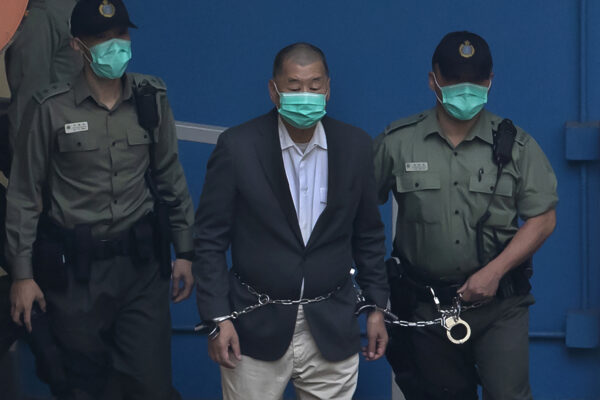
China is the world’s worst jailer of journalists, CPJ says
China is the worst jailer of journalists in the world, a report by a New York-based watchdog said, and nearly half of the journalists behind bars in the country are Uyghurs who reported on the persecution of the mostly Muslim group in Xinjiang. In its 2023 prison census, conducted on Dec. 1, the Committee to Protect Journalists, or CPJ, found that there was a spike in arrested journalists, with 320 believed to be behind bars – close to a record high. More than half of those jailed journalists were charged with false news, anti-state or terrorism charges in retaliation for their coverage, the group’s research found. China led all countries, with 44 journalists in prison, accounting for 32% of the worldwide total. Following closely behind was Myanmar, with 43. Vietnam was fifth on the list with 19, ahead of Iran and just behind Russia. Hong Kong media mogul and pro-democracy activist Jimmy Lai, is escorted by Correctional Services officers to a Hong Kong court appearance, Dec. 12, 2020. (Kin Cheung/AP) “China has long ranked as one of the world’s worst jailers of journalists,” the report said. “Censorship makes the exact number of journalists jailed there notoriously difficult to determine, but Beijing’s media crackdown has widened in recent years, with 2021 marking the first time journalists from Hong Kong were in jail at the time of CPJ’s census.” In addition to Hong Kong, Xinjiang was another chief area of concern, according to the report. Of the 44 imprisoned journalists in China, 19 are Uyghurs. Among them is Ilham Tohti, a professor who was also the founder of the news website Uighurbiz. Tohti was arrested almost exactly 10 years ago, and later sentenced to life in prison on charges of separatism. Another is Qurban Mamut, the former editor-in-chief of the popular Uyghur journal Xinjiang Civilization. Mamut went missing in November 2017 and RFA learned in 2022 that he was sentenced to 15 years in prison for “political crimes.” Media gather outside the offices of Stand News in Hong Kong on December 29, 2021, after police raided the office of the local media outlet and arrested six current and former staff. (Daniel Suen/AFP) “Chinese authorities are also ramping up the use of anti-state charges to hold journalists, with three out of the five new China cases in CPJ’s 2023 database consisting of journalists accused of espionage, inciting separatism, or subverting state power,” the report said. “Many journalists charged are ethnic Uighurs from Xinjiang, where Beijing has been accused of crimes against humanity for its mass detentions and harsh repression of the region’s mostly Muslim ethnic groups,” it said. ‘Silencing minority voices’ The disproportionate number of jailed Uyghur journalists mirrors the situation in Xinjiang, Beh Lih Yi, the CPJ’s Asia program coordinator told RFA Uyghur. “Nearly half of the journalists behind bars in China in 2023 were Uighur journalists. They have been targeted under vague charges such as inciting separatism or being ‘two-faced,’ a loose term Chinese authorities often use to punish those they see as publicly supporting government policy but secretly opposing it,” said Yi. “The media repression highlights the Chinese government’s harsh attempt to silence minority voices and independent reporting – even as Beijing repeatedly rejected claims of widespread human rights abuses in Xinjiang,” he said. A giant screen in Beijing shows Chinese President Xi Jinping visiting Xinjiang Uyghur Autonomous Region July 15, 2022. (Tingshu Wang/Reuters) He said that long-term sentences for Uyghur journalists were “outrageous and cruel,” and called on the Chinese government to release all its imprisoned journalists and allow all journalists to freely report in Xinjiang. The report proves the importance of the work of Uyghur journalists, Zubayra Shamseden of the Washington-based Uyghur Human Rights Project said. “It is clear from the imprisonment of Uyghur journalists that China doesn’t want the international community to know anything about Uyghurs,” said Shamseden. “Uyghur journalists report on Uyghur issues. They are the voices of the Uyghur people in the world. By imprisoning Uyghur journalists, China is attempting to crush the voices of Uyghurs.” The report also noted that Israel saw a huge spike of journalist jailings last year, with all those known to be behind bars on the date of the census having been arrested in the West Bank. Additional reporting by Mamatjan Juma. Edited by Malcolm Foster.
Two civilians die as fighting continues in northern Myanmar
Fighting between the Kachin Independence Army and junta troops in northern Myanmar left two residents dead, locals told Radio Free Asia on Friday. On Thursday morning, the Kachin Independence Army and other local resistance militias raided a police station and the three infantry battalions stationed in Mongmit, locals said. Junta troops soon retaliated by land and air, they added. Fighting flared up again Friday morning after a brief respite, residents said, with battles intensifying near the town’s center. The junta’s airstrikes continued into Friday afternoon, one local told RFA, declining to be named for security reasons. “[The junta] is still firing now from a fighter jet. We had to hide in basements,” he said. “Now, there’s fighting near the police station and the market.” The jet dropped six bombs on Friday morning, he added. Airstrikes were particularly heavy on Thursday, with at least 10 bombs damaging some residents’ homes, locals said. A 37-year-old man named Si Thu was killed by a bomb blast, they said. Another man in his 40s died of apparent heart failure. Three others were injured, they added. Because of the ongoing attack, families and aid organizations have not been able to collect the bodies, one resident said. “One of the four injured in yesterday’s airstrike has died. Another pedestrian died after suffering a heart attack caused by the sound of explosions,” they said, declining to be named for fear of reprisals. “We have not moved their bodies yet. No one can go out.” Most of the village’s 10,000 residents have fled to nearby villages, he added. Residents told RFA that junta troops are strictly inspecting civilians fleeing through the city’s exits. Myanmar’s regime has not released any information about the fighting in Mongmit. RFA contacted Shan state junta spokesperson Khun Thein Maung and the Kachin Independence Army’s information officer Col. Naw Bu for comment, but neither answered by the time of publication on Friday. Clashes between the Kachin Independence Army and junta troops have persisted since Monday in Kutkai and Mongmit townships. The KIA is not part of the alliance of ethnic armies that agreed a ceasefire with the junta on Jan. 11 in several townships across Shan state. That China-brokered ceasefire has already faltered with the Three Brotherhood Alliance claiming the junta launched airstrikes on Mongmit and two other townships in the northern state on Sunday The alliance also announced in a press release Wednesday that one of its members, the Myanmar Democratic National Alliance Army, had retaliated after the junta fired grenades at its troops. Translated by RFA Burmese. Edited by Mike Firn.

Only 3% of Taiwanese see themselves as primarily Chinese: US survey
Only 3% of adults in Taiwan see themselves as primarily Chinese, despite Beijing insisting that Taiwan is a Chinese province and should be reunified with the mainland, a new survey has found. Some 67% of respondents to the survey said they were primarily Taiwanese and not Chinese, while 28% think of themselves as both Taiwanese and Chinese, U.S. Pew Research Center said in its report on Tuesday. 2% did not respond. In total, 2,277 people took part in the survey which focused on how people in Taiwan think of their identity. Interviews were conducted via telephone, and the margin of error was 2.64. To the question “How emotionally attached do you feel to the country of China,” 11% of respondents said they are “very emotionally attached” while 32% answered “not at all attached.” Adults under the age of 35 are especially likely to identify as solely Taiwanese (83%), and women are more likely than men to do so (72% vs. 63%). Pew conducted the survey in the period between June 2 to Sept. 17, 2023, several months before the election that saw Lai Ching-te from the ruling Democratic Progressive Party (DPP) elected president. The DPP, however, lost its majority in the 113-seat legislature after the Jan. 13 election to the more pro-Beijing Kuomintang. Tied to politics “Identity in Taiwan is tied to politics,” Pew’s researchers said, “Those who consider themselves primarily Taiwanese are most likely to align themselves with the DPP.” “Meanwhile, those who regard themselves as both Chinese and Taiwanese, or as primarily Chinese, are more aligned with the Kuomintang (KMT),” they said. At the parliament, the KMT won 52 seats to the DPP’s 51 seats. “Few in Taiwan are happy with how things are going there today,” the report said. Some 24% of respondents expressed satisfaction, while 32% were dissatisfied and 37% were neither satisfied nor dissatisfied. Taiwan celebrates the arrival of 2024 with fireworks at Taipei 101 Tower in Taipei, Taiwan January 1, 2024. (Reuters/Ann Wang) Those who support the ruling DPP, as well as those who consider themselves primarily Taiwanese, were more likely to express satisfaction with how things are going in Taiwan. Only 10% of those who support the opposition KMT said they were content with the current situation. Most people across age groups and political alignments, even those who identify as primarily Chinese, consider China’s power and influence a threat to Taiwan, according to the survey. The survey found that 66% categorize it as a major threat, more than those who said the same about the United States (45%) or Russia (25%). Earlier research found DPP supporters favor the U.S. over China, while KMT supporters favor China over the U.S., the report added. Edited by Mike Firn and Taejun Kang.
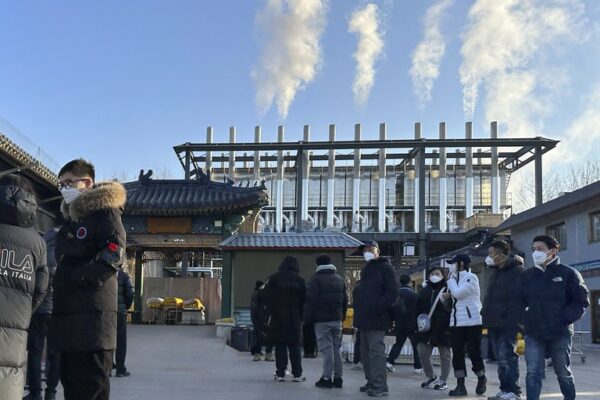
China’s population falls and economy sputters
China’s population fell by 2 million people last year, fueled by long-term decline in birth rates and a wave of deaths from COVID-19, as the country reported slower-than-expected economic growth in the fourth quarter despite government claims of a post-lockdown recovery. Economic expansion of 5.2% from October through December achieved the government’s target, but prospects for short-term growth remain hampered by a burst real estate bubble, weak consumer and business confidence and mounting local government debt. And the slump is proving a major obstacle in the government’s attempts to get people to have more children to boost consumption and curb the aging and shrinking of the population. The total number of people in China fell by 2.08 million, or 0.15%, to 1.409 billion in 2023, the National Bureau of Statistics reported on Wednesday, compared with a fall of 850,000 in the previous year. Total deaths last year rose by 6.6% to 11.1 million, with the death rate reaching the highest level since 1974, at the height of the political violence of the Cultural Revolution. Experts have estimated that the initial wave of Omicron that followed the lifting of three years of lockdowns, compulsory testing and mass quarantines under President Xi Jinping’s zero-COVID policy likely infected up to 1.2 billion people in China. As the first wave hit an under-vaccinated population, funeral homes and crematoriums were working around the clock to deal with a massive wave of deaths, leading experts to estimate that as many as 1 million people died. Mourners stand outside a crematorium as columns of smoke pour out of chimneys in Beijing, Dec. 31, 2022. (Ng Han Guan/AP) Meanwhile, new births fell 5.7% to 9.02 million and the birth rate was a record low 6.39 births per 1,000 people, down from a rate of 6.77 births in 2022. The working-age population of people aged 16 to 59 fell by more than 10 million, or just over 60% of the population, weakening attempts to spur recovery through domestic consumption alone. Youth unemployment Unemployment among 16-24 year-olds stood at 14.9%, according to the National Bureau of Statistics’ revised calculation method, compared with more than 20% under the previous calculation method. Both the population figures and youth unemployment rates are highly sensitive topics for the ruling Communist Party, which is keen to sing the praises of the economy in a bid to boost people’s confidence in the future. An article leaking Wednesday’s official figures was deleted from China’s tightly controlled internet late last month. Yet even officials admitted that things were not all they could be. “The employment situation this year is still under pressure, while structural contradictions in the employment of some groups and some industries are prominent,” National Bureau of Statistics chairman Kang Yi told a news briefing in Beijing on Wednesday. Good things are happening with China’s economy, says National Bureau of Statistics Director Kang Yi during a press conference in Beijing, Jan. 17, 2024. (Image from National Bureau of Statistics video) “However, as the economy picks up and improves, as industrial transformation and upgrades accelerate, positive factors for stabilizing employment are also constantly on the increase,” he said. Economist Si Ling said most people aren’t buying the government’s upbeat claims, however. “There are issues with almost all of China’s macroeconomic performance and numerical statistics, the job market is bleak, and economic performance is really shocking,” he said. “Unemployment is highest among the age group that used to find it easiest to get jobs, people under 20,” he said. “A serious lack of growth momentum coupled with unsatisfactory macroeconomic performance make it very hard to create new opportunities and to attract young people to join in [become economically active].” Facing crises? Chu Yue-chung, assistant professor of finance at the Southern Taiwan University of Science and Technology, said few people will be taken in by the “recalculation” of the youth unemployment figures. “Logically speaking, under normal circumstances, the employment rate should be better among young people,” Chu said. “Businesses naturally want to hire young people because … older people want higher salaries.” “But this is not the reality, and there is a big problem with that.” University graduates attend a job fair in Wuhan, China, Aug. 10, 2023. (AFP) U.S.-based economist Cheng Xiaonong, said China is facing an economic and financial crisis, yet the government is hoping to reassure foreign investors and stabilize business confidence, citing a Jan. 16 speech by ruling Chinese Communist Party leader Xi Jinping in which he promised a “tough” approach to the financial sector. “Xi pointed out that efforts must be made to prevent and defuse financial risks, especially systemic risks,” state news agency Xinhua paraphrased him as saying. “Financial regulation must be ‘sharp and tough’.” “Local governments should not just do their financial work well, but also focus on the big picture, and manage well [the] financial risks under their jurisdiction and perform their duties well in maintaining stability,” it quoted Xi as saying. “Corruption must be resolutely cracked down on … and anyone in charge must be held accountable for risk control. We should also crack down on financial crimes,” he said. According to Cheng, Xi only had one message to put across in that speech. “That is, that the financial crisis is already here, and it can’t be resolved by conventional means,” he said. “It’s aimed mostly at domestic Chinese banks [because] he thinks bank officials and employees aren’t doing their best.” “He is saying he will blame them for bad debts incurred during his time in office, that they have to solve this, and if they can’t, they’ll be arrested,” Cheng said. Translated by Luisetta Mudie. Edited by Malcolm Foster.
Days after ceasefire, northern Myanmar sees more battles
Fighting erupted between the junta and allied ethnic groups in northern Myanmar just days after the two sides agreed a ceasefire, according to a statement released Wednesday by the Three Brotherhood Alliance. The alliance accused junta soldiers remaining in Shan state’s Kokang of firing grenades, the statement said. It added that junta troops launched the weapons from 30 meters (98 feet) away while allied Kokang resistance fighters were stationed near Kachin mountain. Despite the ceasefire reached during a third round of China-brokered peace talks in Kunming on Thursday night, the Myanmar National Democratic Alliance Army retaliated and fighting began again around 4 p.m. on Tuesday. The alliance claimed junta troops fired back three times with heavy weapons before retreating. Despite the ceasefire, it’s possible that remaining junta troops separated from the rest of the army would open fire and attack, a military analyst who wished to remain anonymous for security reasons told Radio Free Asia on Wednesday. “The areas of Laukkai, Konkyan, and Yan Long Keng are very rough and it’s difficult to communicate there. It’s probably the remnants of the junta army that went into the forest during the [previous] battles,” he said. “I am not sure whether they know about the ceasefire after the [Kunming] talks.” The Myanmar National Democratic Alliance Army, one of the groups making up the Three Brotherhood Alliance, captured Laukkai city in Kokang’s Self-Administered Zone when more than 1,000 junta troops surrendered on Jan. 4 Although the Myanmar National Democratic Alliance Army sent the surrendering troops back to Lashio, some who were separated from the main group may have initiated the attack, military observers said. Both the alliance and regime announced their public agreement to the ceasefire on Friday. According to the agreement, all parties involved would immediately cease fighting in their current locations. Starting Friday, the Three Brotherhood Alliance agreed to refrain from attacks on cities and junta camps. Regime forces similarly committed to halting airstrikes and other heavy weapons attacks. However, tensions still run high. When the Kachin Independence Army launched an attack on a Kutkai military base Sunday night, the junta Defense Service released a statement claiming the Three Brotherhood Alliance’s Ta’ang National Liberation Army was involved. Despite the ceasefire, the alliance is still preparing for future battles, claiming in a statement released Sunday that the regime is launching an offensive that began on Saturday. The statement added the junta is also responsible for airstrikes and heavy weapons attacks in Mongmit, Kutkai, and Kyaukme townships after the ceasefire agreement. RFA called Shan state junta spokesperson Khun Thein Maung and national junta spokesperson Maj. Gen. Zaw Min Tun for more information on these accusations, but calls went unanswered Wednesday. According to data compiled by RFA, in the more than two months since Operation 1027 launched on Oct. 27 to Friday’s ceasefire, the alliance captured 15 cities in northern Shan state. Translated by RFA Burmese. Edited by Mike Firn.
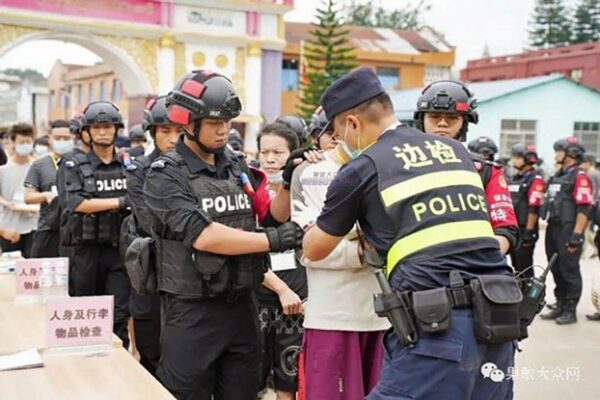
What role did China play in a rebel group’s victory in northern Myanmar?
When the Three Brotherhood Alliance of rebel groups in Myanmar started a campaign against junta forces in the northern part of the country they chose a slogan designed to win support from a fourth potential ally: China. “Wipe out the scammers, rescue our compatriots,” the group declared in the message. China, which shares a border with Kokang, a region in Shan state in northern Myanmar, had expressed increasing frustration with organized crime rings that had been allowed to operate in the area by junta-aligned forces. An estimated 120,000 people are being held in Myanmar against their will. Chinese nationals have both been trafficked by these groups and fleeced by them. The Myanmar National Democratic Alliance Army – which along with the Ta’ang National Liberation Army and the Arakan Army make up the Alliance – had tried and failed twice before to retake the region. This time, however, Kokang’s capital of Laukkai fell into rebel hands on Jan. 4. Since then, China has played a clear role in mediating a truce between the two sides. But the initial success of the rebel campaign has led analysts to speculate that it had, in fact, received Chinese backing. China’s leaders may have sought to kill “two birds with one stone,” according to Deng Yuwen, a political commentator and former journalist – strengthening China’s position in the region while removing the destabilizing threat presented by the scam compounds. “The Chinese government can use the scamming operations as a way to secretly support local forces … and control the area that way,” Deng said. “They solve the scamming problem and cultivate bold agents of the Chinese state at the same time,” he said, meaning China believes the new leaders of Kokang will better reflect its interests. Chinese police arrest Chinese nationals allegedly involved in online scamming operations in Myanmar, Dec. 10, 2023. (Kokang officials) A ‘king’ and a coup Kokang has long been in China’s orbit, and many of its residents are ethnically Chinese. In the mid-20th century, Kokang served as a base for Myanmar communists. With the collapse of the Communist Party of Burma in 1989, local warlord Peng Jiasheng – whose nickname was “the king of Kokang” – switched his allegiance to the junta. The military granted the region autonomy and allowed Peng to keep his military presence in the area, though China remained an important patron. In 2009, Peng was ousted in a coup led by his second-in-command, Bai Suocheng, who consolidated his family’s control over the state. Bai allowed government troops to be stationed in Kokang for the first time while residents were granted Myanmar nationality. Bai offered sanctuary to criminal groups in return for huge payouts that also benefited the junta. Eventually, massive, organized scam operations began to thrive in Kokang. China pushes back Last year, the Chinese government appeared fed up. In August, it took part in a joint operation with Myanmar and Thailand targeting the scam centers. Over the intervening months, more than 40,000 Chinese nationals were arrested in Shan state for involvement with online scams, according to data collected by RFA. A number of powerful Kokang business people were arrested at a trade fair in China in October, and in November, Beijing issued arrest warrants for a well-connected Kokang politician and three family members on allegations of masterminding an online scam ring. China’s Ministry of Public Security issued arrest warrants for 10 people, including the former chairman of the Kokang self-administered region, Bai Suocheng [top row, first left], his son Bai Yingcang [top row, second left] and his daughter Bai Yinglan [top row, third left]. (The Kokang) On Dec. 10, China’s Ministry of Public Security put out another wanted list, naming 10 individuals in connection with the scams, including Bai Suocheng, his grown children and a few junta officials. The move not only showed Beijing’s growing impatience with Myanmar’s handling of the scam rings, but signaled that China favored leaders in Kokang more closely aligned with its national interests. The prince’s plans After he had been dethroned as the king of Kokang, Peng Jiasheng resurfaced as the leader of the MNDAA, fighting Myanmar forces on occasion without significant success. When he died in 2022, his son, Peng Denren, took over and immediately made plans to reclaim control of his father’s lost territory. The Alliance launched “Operation 1027” – so-called for the on Oct. 27, 2023, date – offensive against Myanmar military strongholds in northern Myanmar. Even though the Alliance remained outnumbered by government troops, the rebel forces scored several significant victories early on. Its soldiers have since seized more than 300 military bases, around a dozen towns, and won control of several key trade routes with the neighboring Chinese province of Yunnan. Members of the Myanmar National Democratic Alliance Army walk past a Myanmar military base after seizing it during clashes near Laukkaing township in Myanmar’s northern Shan state, Oct. 28, 2023. (Kokang Information Network/AFP) Suspicion over ‘foreign’ experts Myanmar’s junta chief in November claimed that the ethnic-minority armed groups were getting outside assistance, according to a report by Agence France-Presse. He said the rebels had been using “drones with advanced technology” to attack junta positions and were aided by “foreign drone experts,” although he didn’t specify which country they came from. Li Jiawen, a spokesman for the MNDAA, denied the offensive was aided by the Chinese. “The situation we have today is the result of nearly 70 years of tyranny by the junta,” Li said. Even China’s tacit approval of the operation is important, Yun Sun, the director of the China Program at the Stimson Center, a Washington, D.C.-based think tank, said in an interview with RFA. “The biggest support that China has lended to this organization is to not stop them,” she said. Rebel forces were able to retreat over the border to avoid junta artillery barrages. China allowed the flow of money and goods in Shan state that helped to sustain the rebels to continue, Sun said. And there was likely a psychological…
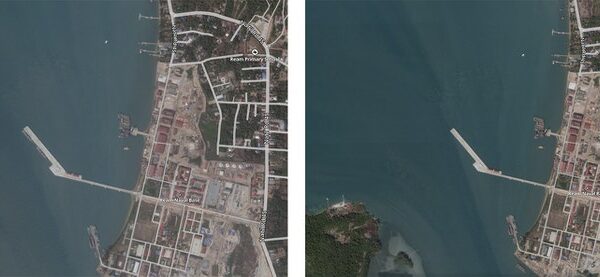
Chinese warships leave Cambodia’s Ream naval base
Two Chinese warships leading a training program for the Cambodian Navy since early December have left the Ream naval base, satellite imagery shows. Images captured on Jan. 15 and provided by the U.S. earth imaging company Planet Labs show an empty berth at the new pier, where the two People’s Liberation Army (PLA) corvettes were docked for several weeks. The ships were still seen as of Jan. 13, 2024. The new pier at Ream Naval Base on Jan. 13, 2024 (left) with two vessels and on Jan. 15 without any vessel. (RFA via Planet Labs) Radio Free Asia reported on Dec. 5, 2023 about the arrival of the PLA vessels – the first foreign warships to gain access to the new China-funded facility with a deep-draft pier that can accommodate aircraft carriers. A U.S. State Department spokesperson said at that time that Washington had “serious concerns” about China’s plans for exclusive control over portions of Ream Naval Base, and was watching closely. The Chinese ships provided on-ship and in-port training to Cambodian navy staff, according to the Ream naval base’s social media. They may have also taken part in confidence-building activities with the local navy and population, according to Carl Schuster, a retired U.S. Navy captain and former director of operations at the U.S. Pacific Command’s Joint Intelligence Center. “All port visits have a political element,” Schuster told RFA, “Allowing ship tours to visitors from the town, working with local naval forces and meeting with local officials often are more important than the training activities.” People-to People Exchange Year The ships’ departure took place as Cambodia and China officially launched a new campaign to boost bilateral ties and tourism called “The 2024 Cambodia-China People-to-People Exchange Year.” Chinese and Cambodian media reported that a launching ceremony was held last Saturday in Siem Reap. Former Defense Minister Tea Banh, now a member of the Supreme Privy Council to King Sihamoni, and Li Shulei, a member of the Political Bureau of the Chinese Communist Party’s Central Committee, presided over the event. Tea Banh said that the campaign “will inject fresh momentum into building a high-quality, high-level and high-standard Cambodia-China community with a shared future in the new era,” according to Xinhua news agency. Cambodian dancers at the launch ceremony of the 2024 Cambodia-China People-to-People Exchange Year on Jan. 13, 2024. (Tea Banh’s Facebook) Cambodia received 2.36 million Chinese tourists in 2019, accounting for 35.7% of total international tourist arrivals. China and Cambodia have seen a rapid development of their relationship, with Beijing providing Phnom Penh with much needed financial assistance. Siem Reap is where a new Chinese-financed airport began operations in October. The airport has a capacity of 7 million passengers a year and serves as a gateway to Cambodia’s most important tourist destination – the Angkor Temple complex. The Siem Reap-Angkor International Airport was funded by a Chinese company under Beijing’s Belt and Road Initiative development plan. Another big airport near the capital Phnom Penh is also being financed and developed by China. More than 40% of Cambodia’s US$10 billion in foreign debt is owed to China, according to the Cambodian Ministry of Economy and Finance. For its part, Phnom Penh has become one of Beijing’s vocal supporters. After the weekend’s elections in Taiwan, Cambodia immediately “reaffirmed its strong support for the One-China policy.” “In light of the recent developments in Taiwan, the Ministry reiterates Cambodia’s resolute adherence to the One China policy, recognising the People’s Republic of China as the sole legitimate authority representing the entirety of China,” Foreign ministry’s spokesman An Sokhoeun was quoted as saying by local media. Edited by Mike Firn and Taejun Kang.
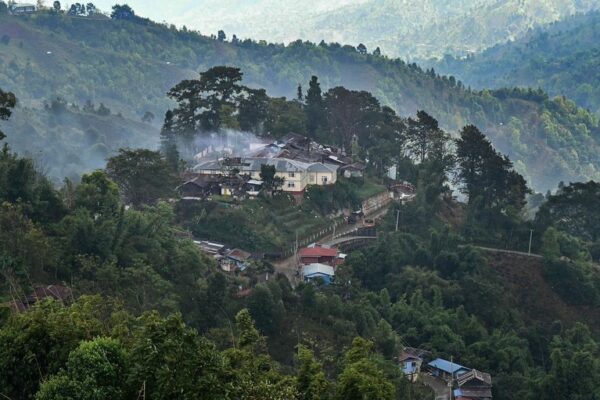
Time is not on Myanmar junta’s side, almost 3 years after coup
In his televised New Year’s address to the country, Myanmar’s junta leader Min Aung Hlaing vowed to prioritize economic growth in 2024, apportioning all the blame for the country’s sharp economic contraction on the opposition his coup ousted almost three years ago. Min Aung Hlaing made no mention of the military’s setbacks since the Three Brotherhood Alliance of ethnic armies in northern Myanmar launched their offensive on October 27, 2023. And while the losses, which include over 30 towns and the surrender of over 3,000 troops are real, the continued economic crisis remains the junta’s single largest vulnerability. Smoke rises from a burning Myanmar military compound amid clashes with armed group Ta’ang National Liberation Army in northern Shan State, Dec. 13, 2023. (AFP Photo) The economy has shrunk by 10-12 percent since the Feb. 1, 2021 coup that deposed the National League For Democracy-led government. In a recent report, the World Bank predicted the country would only see 1% growth in 2024, given the “broad-based slowdown across productive sectors including agriculture, manufacturing, and trade.” Over half the population is living beneath the poverty line, while the World Bank found that 40% of surveyed families saw a decline in income in 2023 compared to 2022. The kyat currency has lost half of its value since the coup and it now appears that the State Administrative Council (SAC), as the junta is formally known, has given up any hope of controlling it. Forex woes In early December 2023, the Central Bank of Myanmar announced that it would no longer fix the exchange rate, allowing the currency to trade at market prices. This was a tacit acknowledgement that the gap between the official rate of 2,100 kyat per U.S. dollar and black market rate of 3,500 kyat per greenback was too large to ignore, and that the regime no longer had foreign exchange reserves to prop up the declining kyat. The shortage of dollars also portends a further energy crisis. Electric black- and brown-outs have been common throughout the country, even in Naypyidaw. And shortages of gasoline and diesel increased in late-2023. Fighters of Ta’ang National Liberation Army search a building after running over a compound belonging to Myanmar junta military in Shan State, Dec. 12, 2023. (AFP Photo) The SAC had subsidized energy imports by making dollars available to politically-connected energy importers at below market rates in order to ensure a steady supply of fuel. The junta no longer can afford that. In late December, there were reports of tankers refusing to unload in Yangon’s Thaliwa port until they were paid, indicating a dire shortage of dollars. The regime has been encouraging border trade with China and Thailand, which is conducted in Chinese yuan or Thai baht. But the loss of key border areas is hampering that. While SAC forces still control the border city of Muse, which handles almost 90% of border trade with China, the Three Brotherhood Alliance now controls the Mile 105 Trade Zone as well as a host of smaller border crossings, such as Chin Shwe Haw. Muse and Lashio are the only towns in northern Shan State that are still under junta control. Ethnic armies on the march The Three Brotherhood Alliance – Arakan Army, Myanmar National Democratic Alliance Army, and Ta’ang National Liberation Army – now controls almost all towns along highways 3 and 34, to the border. Ta’ang National Liberation Army forces captured a military camp as far west as Nawnghkio, which is only 15 miles from Pyin Oo Lwin, home of the Defense Services Academy, though the Air Force has intensified airstrikes to retake the town. Among advances by other ethnic armies, Karenni forces now control much of the state including the trade routes to Mae Hong Son in Thailand. The Karen National Union has been consolidating its position along the Thai border. Fuel prices, delays at the border and increased transportation costs resulted in some $500 million in lost border trade in the two months following the launch of Operation 1027 in northern Shan State. Border trade accounts for 40% of exports and 21% of imports. Myanmar Now, citing Commerce Ministry figures, found that exports to Thailand and China in the last 9 months of 2023 fell by $178 and $157 million, respectively. Residents of an improvised neighborhood gather to receive rice distributed by the World Food on the outskirts of Yangon, May 21, 2021. Over half the population in Myanmar live beneath the poverty line. (AFP Photo) Sector after sector have been hit hard. In late November, the SAC stopped supplying fuel to industrial estates, calling on factory owners to negotiate their own energy purchases. In the key garment sector, 271 of 817 factories (33%) have shut down since the coup – due to shortages of foreign exchange to pay for raw materials, high energy prices, and the loss contracts and foreign investor unease with the human rights situation. Even Chinese-owned firms are closing. For those still employed, wages are stagnant and being eaten up by inflation, which remains high at 29%. Prices of staples, including rice, eggs, and cooking oil, have soared. The junta refused to increase the minimum wage for workers, instead offering a 1,000-kyat (US$0.20) daily allowance. The current minimum wage was set in 2018. Myanmar Kyat notes are seen in a donation coffer at a Buddhist pagoda in Yangon, April 17, 2017. (Roberto Schmidt/AFP) The agriculture sector has been impacted by changing weather patterns and shortages of imported fertilizers and pesticides. While the cost of production has soared for farmers, in mid-September 2023, the junta imposed price ceilings on wholesale rice trade to stabilize prices for urban consumers. U.S.-imposed sanctions on the Myanma Investment and Commercial Bank and Myanmar Foreign Trade Bank, which were responsible for most of the U.S. dollar transactions, have crippled foreign trade. Singapore’s United Overseas Bank has been quietly closing Myanmar-linked accounts, further hampering their international transactions. In December 2023, three Myanmar nationals, including Kyaw Min Oo, the CEO of Sky Aviator, were…
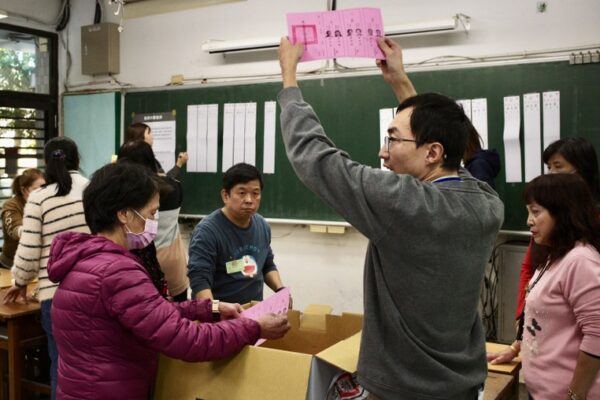
Counting underway in Taiwan’s pivotal presidential election
Voting has ended and counting is underway in Taiwan’s presidential election, a ballot that will shape its future relationship with China and stance on independence and stability. Polls opened at 8:00 a.m. at nearly 18,000 locations, from the island’s south to its capital Taipei and closed at 4 p.m with votes immediately being counted and reported to the election authorities soon after. The result for Saturday’s election should be clear by late evening when the losers concede and the winner gives a victory speech. At stake is the peace and stability of the Taiwan Strait between the Chinese mainland and the self-governed island, claimed by Beijing as its own, but equally important are bread-and-butter issues. Key candidates in the presidential race are: Vice President Lai Ching-te of the independence-leaning Democratic Progressive Party (DPP), Hou Yu-ih of the Beijing-favored Kuomintang (KMT) and Ko Wen-je of Taiwan’s People’s Party (TPP). Former physician and mayor of Tainan, Lai, known for his support of Taiwan independence, aims to continue President Tsai’s policies of maintaining Taiwan’s de facto independence amidst heightened tensions with Beijing. Facing challenges like slow wage growth and high housing costs, Lai’s DPP, once an opposition to the KMT’s rule, now faces criticisms of being the establishment. “Today is a glorious day, great weather to vote. I encourage everyone to go vote, demonstrate the vigor of Taiwanese democracy,” said Lai after casting his vote in his hometown of Tainan. “Let Taiwan continue to move forward.” Hou from the KMT, a former police officer and mayor of New Taipei City, represents a “Taiwanese flavor” in politics, which his party believes could help attract a broader voter base beyond its traditional supporters; he advocates for dialogue with Beijing under the “1992 consensus” to reduce cross-strait tensions. However, the viability of this consensus is in question since Chinese President Xi Jinping’s 2019 interpretation aligned it with a stringent “one China principle,” echoing the increasingly restrictive model seen in Hong Kong. “I am very happy to see people voluntarily come out to vote early in the morning. This demonstrates a very important voting behavior of Taiwanese democracy in the electoral process – where democracy is used to select the most ideal president, vice president and legislators,” said Hou after voting in New Taipei City. “More importantly, no matter how chaotic the election process is, everyone must unite after the election.” Ko, a former surgeon turned politician, founded the TPP four years ago, focusing on domestic issues like energy and housing, after a surprising victory in Taipei’s mayoral race as an independent. While the TPP isn’t strong enough to dominate the legislature, Ko aims to position it as a parliamentary power broker, advocating for a coalition with the KMT and offering a “third choice” to voters, with policies aligning more closely with the KMT’s stance on China. Asked by journalists how he felt after casting his ballot in Taipei, Ko said:”Keep a normal mind, finish what one needs to finish every day, and plan for the next stage after each is completed.” An official of a polling station holds up a ballot slip, as vote counting for the presidential elections commences, at a high school in New Taipei City on January 13, 2024. (Sam Yeh / AFP) Just hours before the polls got underway China continued to assert its presence in the region. Taiwan’s defense ministry said eight People’s Liberation Army (PLA) aircraft and six PLA Navy vessels were detected around the island as of 6 a.m. local time, with one aircraft entering Taiwan’s Air Defense Identification Zone. Some voters may be dissuaded from supporting independence-leaning candidates by China’s military threats, but the United States has pledged support for whichever government forms. A White House official said on Wednesday that U.S. President Joe Biden will send an “unofficial” delegation of former officials to Taiwan following the presidential elections. Aside from tensions with China, the Taiwan election is also predominantly determined by domestic concerns. In November 2023, Taiwan’s statistics bureau reported its GDP growth forecast as 1.42%, the lowest since 2008. Taiwan is grappling with soaring housing prices, ranked among the highest globally, while its wage levels were among the lowest compared to other developed economies, according to March figures. The outcome of the elections will also impact the security and economy of neighboring countries like Japan and South Korea. Taro Aso, the former Prime Minister of Japan, recently warned that China’s territorial claims on Taiwan could lead to a dire crisis for Japan, necessitating Tokyo’s intervention in the Taiwan Strait during any conflict to protect its citizens. Additionally, a Bloomberg Economics report released on Tuesday indicated that South Korea’s GDP would face the second-largest drop, after Taiwan, if a war were to break out between China and the democratic island. A woman casts her vote in the presidential election at a polling station in a temple in New Taipei City on Jan. 13, 2024. (Alastair Pike/AFP) Experts who spoke to Radio Free Asia said they believe maintaining the status quo is considered the safest approach regardless of the outcome of the elections. Despite Beijing’s ongoing threats to use force to reclaim Taiwan, there’s little belief in an immediate invasion by China, they said, citing several factors at play: Taiwan’s determination to maintain its freedom and identity, the relations between Washington and Beijing, and the U.S.’s commitment to protecting Taiwan’s interests. Above all, the economic cost of a conflict could be devastating for the region and the world. For one, Taiwan is the leading global producer of the most advanced semiconductors. Beyond the presidential and vice presidential elections, there are also 113 legislative seats up for grabs. More than 83% of the total population, or approximately 19.55 million voters, are eligible to cast their ballot. In 2020, DPP President Tsai Ing-wen and her running mate Lai won over 8.17 million votes, or 57.13% of the total, to defeat Han Kuo-yu and Chang San-cheng of the KMT. Additionally, a majority of seats was gained by the DPP in the…

